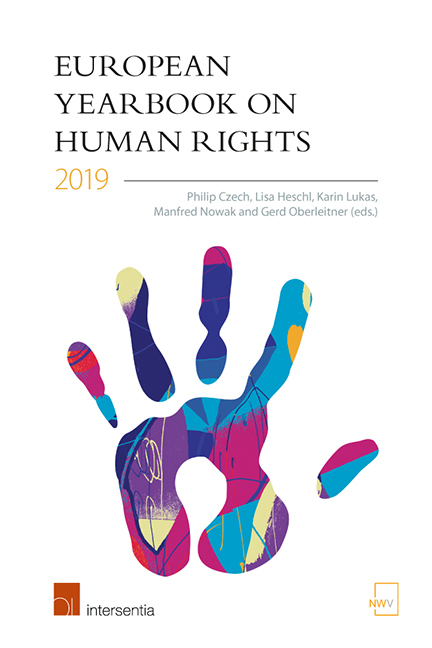Book contents
- Frontmatter
- Miscellaneous Frontmatter
- Editors’ Preface
- Contents
- List of Abbreviations
- List of Contributors
- PART I TOPIC OF THE YEAR
- PART II EU
- PART III CoE
- PART IV OSCE
- PART V REPORTS FROM THE FIELD
- PART VI OTHERS
- PART VII BOOK REVIEWS
- Lisa Heschl: Protecting the Rights of Refugees Beyond European Borders – Establishing Extraterritorial Legal Responsibilities
- Lorenza Violini and Antonia Baraggia (eds.): The Fragmented Landscape of Fundamental Rights Protection in Europe
- Panos Kapotas and Vassilis P. Tzevelekos (eds.): Building Consensus on European Consensus – Judicial Interpretation of Human Rights in Europe and Beyond
- Pieter van Dijk, Fried van Hoof, Arjen van Rijn and Leo Zwaak (eds.): Theory and Practice of the European Convention on Human Rights
- Adrienne Yong: The Rise and Decline of Fundamental Rights in EU Citizenship
- Jeroen Temperman, T. Jeremy Gunn and Malcolm Evans (eds.): The European Court of Human Rights and the Freedom of Religion or Belief – The 25 years since Kokkinakis
- Janneke Gerards: General Principles of the European Convention on Human Rights
- Index
Janneke Gerards: General Principles of the European Convention on Human Rights
from PART VII - BOOK REVIEWS
Published online by Cambridge University Press: 24 January 2020
- Frontmatter
- Miscellaneous Frontmatter
- Editors’ Preface
- Contents
- List of Abbreviations
- List of Contributors
- PART I TOPIC OF THE YEAR
- PART II EU
- PART III CoE
- PART IV OSCE
- PART V REPORTS FROM THE FIELD
- PART VI OTHERS
- PART VII BOOK REVIEWS
- Lisa Heschl: Protecting the Rights of Refugees Beyond European Borders – Establishing Extraterritorial Legal Responsibilities
- Lorenza Violini and Antonia Baraggia (eds.): The Fragmented Landscape of Fundamental Rights Protection in Europe
- Panos Kapotas and Vassilis P. Tzevelekos (eds.): Building Consensus on European Consensus – Judicial Interpretation of Human Rights in Europe and Beyond
- Pieter van Dijk, Fried van Hoof, Arjen van Rijn and Leo Zwaak (eds.): Theory and Practice of the European Convention on Human Rights
- Adrienne Yong: The Rise and Decline of Fundamental Rights in EU Citizenship
- Jeroen Temperman, T. Jeremy Gunn and Malcolm Evans (eds.): The European Court of Human Rights and the Freedom of Religion or Belief – The 25 years since Kokkinakis
- Janneke Gerards: General Principles of the European Convention on Human Rights
- Index
Summary
Jenneke Gerards is Professor of fundamental rights law at Utrecht University, in the Netherlands, and is also a deputy judge in the Appeals Court of The Hague; there is no-one better placed to write a book on the concepts and principles adopted by the European Court of Human Rights (ECtHR) in its interpretation and application of the European Convention on Human Rights (ECHR). In General Principles of the European Convention on Human Rights, Professor Gerards has written an erudite and concise book explaining the Court's approach to the ECHR and the development of its fundamental principles.
In a significant addition to the abundant scholarly literature on the ECHR, this book focuses on the Court's jurisprudential process in its interpretation and application of the Convention. At the same time, Professor Gerards notes that the ‘central importance of the individual assessment of each case on the merits has led to an often strongly case-based and contextualised case law’ (p. 10). More importantly, she explains how the Court has utilised its interpretive methodology to interpret the ECHR as an evolving, dynamic and living instrument.
Professor Gerards’ approach is manifested in her discussion of the use of precedent and her elaboration of the jurisprudential methods utilised in interpreting the Convention. Professor Gerards notes that in interpreting the text of a treaty – which the ECHR is – words and phrases should be given their ordinary meaning; however, instead of relying purely on the text, support for any interpretation is usually found in the object and purpose of the ECHR. The book includes a concise explanation of the use of the travaux préparatoires in the interpretation of the ECHR and notes that, while its content is not decisive, it is increasingly relevant to the interpretation of more recent protocols, which is consistent with what Professor Gerards describes as the Court's ‘evolutive interpretation’. The book also discusses the Court approach to a ‘harmonizing interpretation’ to ensure the ECHR's internal consistency, and the relevance of state practice, common ground interpretation through national and international instruments, and through consensus interpretation. In analysing the impact of international law on the interpretation of the ECHR, Professor Gerards was clear in concluding that ‘the weight given to consensus arguments based on international law is a matter of some controversy within the court’ (102).
- Type
- Chapter
- Information
- European Yearbook on Human Rights 2019 , pp. 583 - 584Publisher: IntersentiaPrint publication year: 2019



